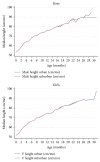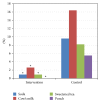Early Obesity Prevention: A Randomized Trial of a Practice-Based Intervention in 0-24-Month Infants
- PMID: 26078877
- PMCID: PMC4442409
- DOI: 10.1155/2015/795859
Early Obesity Prevention: A Randomized Trial of a Practice-Based Intervention in 0-24-Month Infants
Abstract
Objective: A pediatric office-based intervention was implemented following a randomized, controlled design, aimed at improving child feeding practices and growth patterns and ultimately reducing risk for overweight and obesity later in life.
Methods: Four clinics (232 infants) were randomized to control or intervention (I), the latter delivered by health care provider at each of 7-9 well-baby visits over 2 years, using a previously developed program (Growing Leaps and Bounds) that included verbal, visual, and text advice and information for parents.
Results: The I group offered significantly less soda (p = 0.006), sweetened tea (p = 0.01), punch (p = 0.02) and/or cow's milk (p = 0.001) to infants and delayed the introduction of drink/food other than breast milk (p < 0.05). Parents in the I group had a higher perceived parental monitoring (p = 0.05) and restriction (p = 0.01) on infant feeding. While the I group exhibited at baseline more adverse socioeconomic indicators than the control group, growth trajectory or body size indices did not significantly differ between groups.
Conclusions: Education provided by health care providers in addition to follow-up monthly phone calls may help modify parental behaviors related to child feeding and increase parental sense of responsibility toward child eating behaviors.
Figures



References
-
- Ogden C. L., Carroll M. D., Kit B. K., Flegal K. M. Prevalence of obesity in the United States, 2009-2010. NCHS Data Brief. 2012;(82):1–8. - PubMed
Publication types
MeSH terms
LinkOut - more resources
Full Text Sources
Other Literature Sources
Medical

